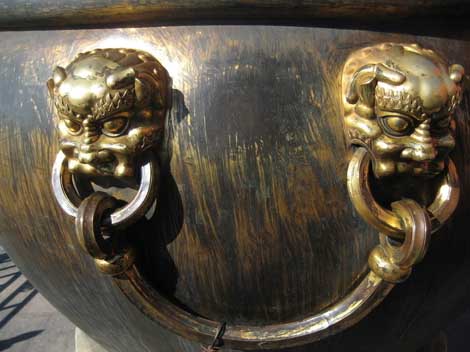Posted 2017/10/19
What Is Ch'i?
Ch'i (pronounced "chee", 气) is the cosmic breath or energy ascribed to the atmosphere, the earth, and humans. It is the positive energy and life force that pervades human existence. Translated as "breath," ch'i is a force that creates mountains and volcanoes, directs streams and rivers, and determines the shapes of trees and plants. Ch'i is in turn created in nature by the gentle, meandering flow of water, by the shape of a mountain, or by the symmertry and cosmic balance of the elements in the environment. It is also an electronic energy that can be measured using sensitive electro-acupuncture machines.
What is Feng Shui?
Literally translated as "wind and water,"*(风水) it is the Chinese art of placement -- of balancing and enhancing the environment by means of spatial layouts on the basis of directions, each having its own characteristics and influences on human affairs. Feng shui dates back at least 5,000 years as a means of bringing peace and balance into people's lives and encompasses a dimension of interior design that can accentuate and complement any style. It was thought to have been introduced to Japan in the sixth century, and established certain criteria for the desirable sites of palaces, residences, and cemeteries. Today a growing number of architects and decorators are integrating its principals into their designs to bring harmony into their homes. Feng shui affects one's ch'i. After analyzing the flow of ch'i, feng shui can be used to help a person "untangle" knots that block happiness and attainment of one's goals and hopes. Moderation and enhancement of ch'i flow is the underlying aim of feng shui. Proper feng shui channels and enhances environmental ch'i flow to improve human ch'i and thus increases happiness, wealth, and vitality.
Feng shui combines intuitive skill and detailed guidelines. Practitioners seek to feel the presence and movement of ch'i guided by a series of ancient prescribed rules. Techniques include using a compass or an octagonal chart called the Ba-Gua to establish the most beneficial placement of rooms, drawing on information from the Chinese horoscope; visually inspecting the surroundings; and even using high-tech equipment to look for environmental hazards. In the end, the goal is to make the dwelling as harmonious as possible and harness universal forces to insure a healthy, wealthy and happy life.
How to Improve Your Ch'i
According to the Chinese, human ch'i can be enhanced through a number of means: meditation, positive human relationships, and a healthy environment -- good feng shui. House ch'i and human ch'i have a lot in common in that they both should flow smoothly. Good ch'i flow in a dwelling improves the ch'i of residents.
Short of hiring a feng shui expert, there are some common-sense thing you can do to begin creating positive ch'i in your home. Avoid sharp, straight edges to keep energy flowing. Always seek clean lines and open spaces, keeping your home free of clutter and obstructions. Consider the relationship between light, color and mood -- avoid harsh overhead lighting and dark monotone color schemes. And listen to your instincts when deciding what room arrangements make you feel most comfortable.
Water Fountains
Proper use of fountains, lights, windchimes and mirrors will symbolically open up the space. Fountains are microcosms of ch'i-activating and money-producing water. They can also be protective; the strength of water disperses the "killing ch'i" of, say, an arrowlike road. Water fountains also create active, positive ch'i. In business they are used to encourage profits.
It is a good idea to activate the wealth sector of the office or home -- the southeast or east corner -- by introducing water into the area in the form of an aquarium with live fish to symbolize growth, or a small fountain to represent continuous turnover of wealth-producing water. The direction of the flow of water should not face the entrance of the room or the house as this will cause ch'i energy to depart. Placed in the southeast, a water fountain will favor communication, creativity and harmonious development. If situated in the east, the fountain is good for career-building, being active and realizing your dreams.
Crystal Balls
Crystal balls have special uses as ritual objects. Hung in a temple near an image of the Buddha, they acquire special powers. The Chinese believe that, blessed by a religious person with high spiritual energy, a crystal ball will convert light into power and energy, and a mantra and blessing will emanate from it and fill the room.
Colors
Everyone's ch'i reacts to a color. However, not all colors affect everybody in the same way. Some colors enhance a person's aura and others detract.
To assess a person's best color, first analyze his ch'i to discern his strong element -- earth, fire, water, metal or wood. All five elements represent colors: wood is blue/green, fire is red, earth is yellow/brown, metal is white, and water is black. These colors follow the five element cycles of mutual growth and decay. Once the element is found, use the cycle of development to see which element's color will enhance it. For example, people with a lot of wood should wear black (the color of water), while white (the metal color) will generally be bad luck. Someone with lots of water should wear white and avoid yellow (the earth color). This can also work for buildings and interior design. Some feng shui masters opine that the United States' luck might well improve if yellow flowers were planted around the White House.